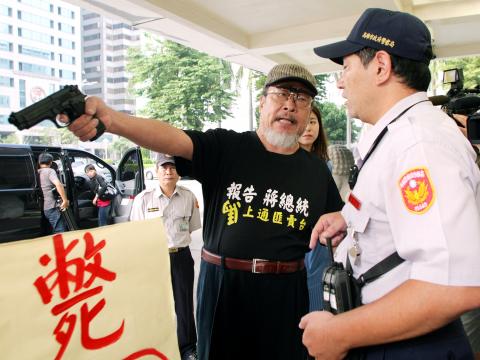Kaohsiung Mayor Chen Chu (陳菊) apologized again yesterday for having taken a nap at her residence on Sept. 19 while Typhoon Fanapi left the city under water.
“Even though I went home to change out of wet clothes and had a short rest ... I should not have done these things. Because of this, the city government left people with a very bad impression. I feel really guilty and sorry,” she said. “I was in Kaohsiung City and did not forsake my duty, but I feel really guilty, I should not have taken a rest.”
A teary-eyed Chen made the comments before entering the Kaohsiung City Council hall for a question-and-answer session.

PHOTO: CNA
While fielding questions from several Chinese Nationalist Party (KMT) councilors on Tuesday, Chen admitted that she returned to her residence at 2:30pm after an inspection tour and rested for about 20 to 30 minutes. She said she went out to inspect the flood situation at 4:52pm before heading back to the emergency operation center at 6:30pm.
At yesterday’s city council session, KMT Kaohsiung City Councilor May Zai-hsin (梅再興) accused Chen of incompetence and demanded her resignation.
“Which one of you would like to take political responsibility? One of the two deputy mayors has to resign,” KMT Kaohsiung City Councilor Wang Ling-chiao (王齡嬌) said, referring to Lee Yung-te (李永得) and Lin Jen-yi (林仁益), who both admitted to being at home.
Chen said she would not shy away from shouldering responsibility for post-flood reconstruction tasks and that she would leave it to the public to judge her performance when they vote in the Nov. 27 special municipality elections.
At a separate setting, Chen’s KMT rival Huang Chao-shun (黃昭順) urged the Control Yuan and prosecutors to launch an investigation into what she said was “negligence of duty” on the part of Chen and her administration.
Premier Wu Den-yih (吳敦義) joined the chorus of critics.
“I don’t understand why Chen Chu had to go back to take a rest at that time,” he said, adding: “If local government chiefs were as cautious as President Ma [Ying-jeou (馬英九)] when the typhoon was approaching, the disaster would not have been so bad.”
KMT Legislator Lin Tsang-min (林滄敏) blasted Chen for not resigning, saying that when Typhoon Morakot hit last year, the opposition attacked then-premier Liu Chao-shiuan (劉兆玄) for getting a haircut and then-Executive Yuan secretary-general Hsueh Hsiang-chuan (薛香川) for dining with his father. They both stepped down to take political responsibility, Lin said.
“There’s no point in having people who had a haircut or had rice porridge [at a five-star hotel] resign, while those who slept at home refuse to do so,” Lin said.

A magnitude 7.0 earthquake struck off Yilan at 11:05pm yesterday, the Central Weather Administration (CWA) said. The epicenter was located at sea, about 32.3km east of Yilan County Hall, at a depth of 72.8km, CWA data showed There were no immediate reports of damage. The intensity of the quake, which gauges the actual effect of a seismic event, measured 4 in Yilan County area on Taiwan’s seven-tier intensity scale, the data showed. It measured 4 in other parts of eastern, northern and central Taiwan as well as Tainan, and 3 in Kaohsiung and Pingtung County, and 2 in Lienchiang and Penghu counties and 1

A car bomb killed a senior Russian general in southern Moscow yesterday morning, the latest high-profile army figure to be blown up in a blast that came just hours after Russian and Ukrainian delegates held separate talks in Miami on a plan to end the war. Kyiv has not commented on the incident, but Russian investigators said they were probing whether the blast was “linked” to “Ukrainian special forces.” The attack was similar to other assassinations of generals and pro-war figures that have either been claimed, or are widely believed to have been orchestrated, by Ukraine. Russian Lieutenant General Fanil Sarvarov, 56, head

‘POLITICAL GAME’: DPP lawmakers said the motion would not meet the legislative threshold needed, and accused the KMT and the TPP of trivializing the Constitution The Legislative Yuan yesterday approved a motion to initiate impeachment proceedings against President William Lai (賴清德), saying he had undermined Taiwan’s constitutional order and democracy. The motion was approved 61-50 by lawmakers from the main opposition Chinese Nationalist Party (KMT) and the smaller Taiwan People’s Party (TPP), who together hold a legislative majority. Under the motion, a roll call vote for impeachment would be held on May 19 next year, after various hearings are held and Lai is given the chance to defend himself. The move came after Lai on Monday last week did not promulgate an amendment passed by the legislature that

FOREIGN INTERFERENCE: Beijing would likely intensify public opinion warfare in next year’s local elections to prevent Lai from getting re-elected, the ‘Yomiuri Shimbun’ said Internal documents from a Chinese artificial intelligence (AI) company indicated that China has been using the technology to intervene in foreign elections, including propaganda targeting Taiwan’s local elections next year and presidential elections in 2028, a Japanese newspaper reported yesterday. The Institute of National Security of Vanderbilt University obtained nearly 400 pages of documents from GoLaxy, a company with ties to the Chinese government, and found evidence that it had apparently deployed sophisticated, AI-driven propaganda campaigns in Hong Kong and Taiwan to shape public opinion, the Yomiuri Shimbun reported. GoLaxy provides insights, situation analysis and public opinion-shaping technology by conducting network surveillance